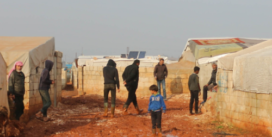- Fall Newsletter, 2025, Issue 15
- Using International Online Learning Modules to Engage Students in the Study of Critical Global Issues
- Upcoming Book Launch: Hearts of Freedom
- Announcing winners of the 2025 CARFMS Essay Contest
- The New York Declaration for Refugees and Migrants and its two Global Compacts: Addressing the Symptoms or the “Root Causes” of Forced Displacement?*
Mutual aid amongst refugees: Evidence from Turkey and Peru, by Nicolas Parent
 Nicolas Parent, PhD Candidate, Department of Geography, McGill University, winner of CARFMS 2021 student essay contest (graduate/law category), nicolas.parent@mail.mcgill.ca
Nicolas Parent, PhD Candidate, Department of Geography, McGill University, winner of CARFMS 2021 student essay contest (graduate/law category), nicolas.parent@mail.mcgill.ca
Over the course of four years (2015-2019) and while conducting research with refugees in Basmane (Izmir, Turkey) and Chorrillos (Lima, Peru), I came across what I believed were authentic examples of mutual aid. [1] Mutual aid, from the anti-capitalist and anarcho-communist writings of Peter Kropotkin, can be understood as the horizontal and free assembly of individuals working towards common physical, emotional, artistic and/or intellectual goal(s), free from – and sometimes in direct response to – coercion and violence. [2]
In both contexts, the existential (and geographic) situation in which refugees found themselves could be best described as ‘organized abandonment’, understood by Ruth Wilson Gilmore as the process whereby a ‘state-in-crisis’ systematically responds to its surplus of labor by directing vulnerable, poor, and racialized persons towards carceral geographies. [3] In these refugee situations, the ‘carceral’ was seen and felt in its broadest sense (as Foucault intended [4]), including not only institutions – prisons and detention centres, for example – but also ‘open’ spaces characterised by surveillance, segregation, containment, and boundary-making. [5]
In Basmane, the destination neighborhood for many Syrians who fled civil war, many refugees expressed the tension between Turkey’s ‘generous’ open-door policy and the precarious conditions they currently endure whilst living in their new host country. Political discourse around rights in the areas of employment, education, and health were in a constant state of flux when I was conducting research here, and particularly so during (and directly after) the 2015 summer months when Fortress Europe announced it was experiencing a ‘migration crisis’. I met Zayna while volunteering at a local community centre, and eventually she introduced me to an ever-expanding group of refugee women. They attended their meetings for different reasons. Some came to discuss their trauma, communicate their difficulties, and draw on others for psychological support. Others came to make plans for (and eventually deliver) an alternative education programme for Syrian children who weren’t being admitted to educational institutions. And others came just to hang out with each other, leadings to new friendships and forms of motherhood that included a reconfiguration of milk kinship relations. As Leyla pointed out to me:
“Right now, this group is part of our survival strategy. I might be dead without it and my children would be in a difficult position. Outside the group we help each other out, share bread and take care of each others’ children. I don’t see the government helping us in this way any time soon, probably ever. I think this group is the way forward even though we don’t all agree on what we can actually do.”
How I saw this group develop over a year encapsulates how mutual aid strategies flourish under conditions of organized abandonment. When Zayna first introduced me to the group, only three women were involved. 18 months later, more than a dozen contributed to its activities, each taking on different responsibilities and ‘projects’ to support each other in a purpose-oriented and meaningful space. This burgeoning was quite the sight to behold.
In Chorrillos, a rather large group of Venezuelan musicians found themselves helping each other following Virginia’s health crisis, a situation that prevented her from playing violin to sustain herself. These musicians lived in a small but tidy place where they had developed a sophisticated system of householding. While some musicians played in public spaces, others either scavenged or rested in one of two rooms with several cramped in bunk beds. When the rotation cycle came to, those that played would pass on their instruments to the outgoing (and rested) crew. Like those of the household, costs associated to the instrument repairs and tune-ups were shared across residents. During an informal chat, Pedro, affectionally called ‘the hustler’ by others, described the microeconomics of their dwelling and comradery:
“All the money we make goes in one place. It is all shared because we need to be fair. Some days, from like Thursday to Sunday, you can make good money. But Mondays are horrible … We don’t want to alternate too much in terms of who plays on what days so that everyone has the opportunity to make money … We just pool the money not to disturb our house schedule … Every week we all meet up, usually very late at night once the performances have ended, and we discuss money stuff … Every month, whatever is left over is divided equally to everyone. Some save it or get themselves something. Others send it home to Venezuela.”
It is these arrangements of egalitarian social organization, reciprocity, householding, and associated acts of substantive economics that I came to see this place – nay, this home – as a vibrant substratum for mutual aid. Hardships related to identification documents, ill health, employment, and xenophobia became forces of solidarity, creating new forms of association.
In Kropotkin’s The Conquest of Bread ([1892] 2015), he notes: “Open any book on sociology or jurisprudence, and you will find there the government, its organization, its acts, filling so large a place that we come to believe that there is nothing outside the government and the world of statesmen” (36). [6] The predicament of may refugees living at the edges of the state, abandoned by its systems of governmentality, shows that many live outside (or rather, ‘beyond’) it. And what if we were to qualify their modes of sociality as anarchic? The deep history of anarchism cannot be accounted for through the events of the 1886 Haymarket Affair or 1999 Seattle Riots, producing shortcuts that reduces this philosophy to violence. As the contemporary anarchist geographer Simon Springer writes, “when I say ‘anarchism’ you hear ‘chaos, violence, mayhem’; when I say ‘anarchism’ I mean ‘cooperation, voluntary association, mutual aid’”. [7] An impoverished reading of anarchism simply exemplifies our surrender to human pessimism and the (perhaps foolish) naturalization of anti-social competition as foundational to human nature. These cases, at the very least, prompt us to think differently. In looking forward to the upcoming CARFMS21 conference, excitingly themed Utopias as Practices, I await contributions that will seriously consider utopian futures as something truly liberating and subversive rather than ‘alternatives’ working within the neoliberal language of resilience and adaptation.
Endnotes
[1] This work has been recently submitted to the Canadian Association for Refugee and Forced Migration Studies, as part of its annual Student Essay contest and for which I was awarded 1st place (graduate/law category).
[2] Kropotkin, Peter. 1989. Mutual Aid: A Factor of Evolution. Montreal: Black Rose Books. Originally published in 1902.
[3] Gilmore, Ruth Wilson. 2007. Golden Gulag: Prisons, Surplus, Crisis, and Opposition in Globalizing California. Berkeley: University of California Press.
[4] Foucault, Michel. 1975. Surveiller et Punir : Naissance de la Prison. Paris: Gallimard.
[5] Moran, Dominique, Turner, Jennifer, and Schliehe, Anna K. 2018. “Conceptualizing the carceral in carceral geography.” Progress in Human Geography 42, no. 5: 666-686.
[6] Kropotkin, Peter. 2015. The Conquest of Bread. London: Penguin Books. Originally published in 1892.
[7] Springer, Simon. 2016. Twitter, 24 February. Available online: https://twitter.com/AnarchistGeog/status/702647627439955968
